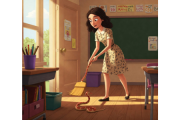This is story #19 in the series “Where Exactly is Home?”. The author recommends you read them in order.
Introduction:
“Where Exactly is Home?” follows the story of my parents, my two younger brothers and me, Susan, who emigrated from war-battered Britain, in the mid-late 1950’s, to Southern Rhodesia, Africa.
The effects of this move on our family were huge, as we struggled to adapt to such a different way of life. Only after further upheaval, and more long-distance travelling, did our family eventually settle in the city of Salisbury, Rhodesia.
However, we did not know then that we would not remain there for the rest of our lives, either.
When the family first went to Africa, I, Susan, was 9 years old. My two brothers, John and Peter, were almost 7 and 4, respectively.
Nowadays, as seniors, John and Peter live in England. I live in Canada. Throughout our lives, we have both benefitted from, and suffered because of, our somewhat unusual childhood.
I, for one, still sometimes ask myself which country represents home to me.
This is a series of stories under the title “Where Exactly is Home?” – I recommend you read them in order, starting with story #1.
19. Two Years to Settle
After two years of coming to terms with living in a small village in the Southern Rhodesian bush, our family had grown used to our new life. We had settled into a routine. My father drove the car to work every day, taking my little brother, Peter, with him on the days when my mother worked for a few hours at the local accountant’s office. I could see that my mother was now happier than she had been at first. After all, she was once more gainfully employed outside the home and she, who was so lively and social, was dealing with clients of the accountant as and when they came into his office.
Furthermore, our conditions at home, though still far from what we had been used to in England, had improved somewhat, At least, we now had clean water running out of our taps, thanks to the borehole that my parents had fought so hard to have built at the end of our property.
We even had a clean and sparkling swimming pool in the village because of my parent’s stalwart persistence and endless efforts towards getting up and running that much needed, but neglected, pool.
I felt as if our family was now more accepted as part of the community. We were no longer “rooinek” upstarts who didn’t appreciate the ways of the wild. I didn’t know that the locals still didn’t approve of the fact that my parents refused to participate in “sundowners”, the social drinking sessions which took place just about every night in someone’s house on someone’s “stoep” (veranda). I was only 10 or 11 years old but knew my parents didn’t drink alcohol. I certainly had no idea that on Saturday evenings these “sundowners” sometimes included wife-swapping. It was only when I was much older that I was told about such events. Since then, I have read tales of others living in the bush where wife-swapping was often a means of entertainment. Car keys were tossed into a central bowl upon arrival. Then, at the end of the evening, the women participants picked any set of keys before going home with the male owner of those keys. My parents were both puritanical and very family-oriented, so no way would they have ever considered attending such parties. I would like to think that, although they were still not really part of the local scene in the full sense of the word, they were perhaps admired to some extent, at least, if not for their morals, then for all that they had accomplished for the benefit of their neighbours, namely clean drinking water and a useable swimming pool.





